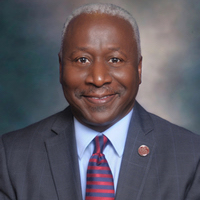 By a vote of 10 to 3, the board of trustees of South Carolina State University has voted to terminate the contract of President James E. Clark, effective immediately. It is generally believed that President Clark was fired for his failure to reverse a substantial decline in student enrollment. In 2011, there were about 4,500 students enrolled at the university. In the fall of 2019, prior to the onset of the pandemic, fewer than 2,500 students were enrolled. During the spring 2021 semester, there were fewer than 2,000 students enrolled.
By a vote of 10 to 3, the board of trustees of South Carolina State University has voted to terminate the contract of President James E. Clark, effective immediately. It is generally believed that President Clark was fired for his failure to reverse a substantial decline in student enrollment. In 2011, there were about 4,500 students enrolled at the university. In the fall of 2019, prior to the onset of the pandemic, fewer than 2,500 students were enrolled. During the spring 2021 semester, there were fewer than 2,000 students enrolled.
James E. Clark was named the 12th president of South Carolina State University in 2016. Clark had been a member of the board of trustees of South Carolina State University for the year prior to his appointment as president. He had also been chair of the University of South Carolina Research Foundation and a member of the board of trustees of Benedict College in Columbia, South Carolina.
Clark had a successful career in business as a vice president of AT&T’s computer division and as an executive for Exxon, Gillette, and General Electric. He is a graduate of the Massachusetts Institute of Technology and the Sloan School of Management at MIT.

The board of trustees of South Carolina State University has named Alexander Conyers as acting president of the university. In May, Conyers was appointed vice president for strategic alliances and initiatives at the university. Conyers had a 28-year career in the U.S. Army. He served at the Pentagon as deputy assistant secretary of the Army.
Conyers is an alumnus of South Carolina State University, where he majored in criminal justice. He holds a master’s degree in corrections from the University of South Carlina and a master’s degree in public administration from Troy University in Alabama.












The President is not responsible for the decline in enrollment. That is something that is occurring across the entire landscape of higher education. Schools must be able to adapt and find new and cleaver ways to attract students. Even when that is done, enrollment declines occur. I am interested in hearing what ideas do “board” members have about how to reverse a trend that is certainly in place in higher education–firing the President does not eliminate the problem just as hiring a new one won’t address the issue. It is also difficult to see what they would have imagine this man to do in the face of a “global” pandemic. Demographic trends are difficult to overcome. Enrollment declines will continue and then flatten out, once that occurs then one can look toward building enrollments. Some institutions will see growth, in this case both demography and geography come together to aid the institution. Since one cannot change one’s geographic location, then one must do something to make the institution more attractive to the limited number of students. Are the board members of South Carolina State willing to give that kind of fiscal and unfettered authority to the President? If not, then the trend will continue.
You’re absolutely correct Webster. I would also venture in saying that until the so-called Black administrators at SCSU are able to minimally convince Black high school students in SC why they should attend SCSU. I just bet the majority of these neoliberal, accommodationists, and politically correct Board of Trustees members probably send their own children to the HWCUs in SC, NC, or GA. Talk about hypocrisy!
Let me get this correct. The recalcitrant SCSU Board of Trustees decide to terminate Mr. Clark for the abysmal enrollment. Really. Instead of directing your misguided and insecure energy towards Mr. Clark, you should have FIRED whoever is in charge of Enrollment Management, Recruitment, Marketing, Communications, and Public Relations. It’s quite evident if All of the Aforementioned were Doing their job Mr. Clark would not have been fired. You have too many fragile egos in positions of authority that continue to make bad decisions.
While I am not as indoctrinated on the intricacies of politics involved in the administration of school policy, I’d like to address this issue from a common standpoint. There was a young student-athlete who is ACADEMICALLY eligible (3.8 GPA) and a very talented basketball player who wanted to attend an HBCU but received no response whatsoever. And as his advisor, his parent and I reached out to several HBCUs, including SCSU, and didn’t even get a response! I was aware of the severe decline there and thought they would have been eager to acknowledge such an applicant. Note: There seems to be epidemic neglect among our HBCU institutions, and I agree – Dr. Clark may have been a scapegoat- but it is evident that even the top administrators drop the ball in demanding accountability. BTW, the student was accepted to a PWI in NC- with a full scholarship. What’s wrong with this picture?
Hey Edd,
You make some very valid points about the dysfunction and overall operations about SCSU and many other HBCUs. You must understand that most top tier Black American HS student athletes Do Not even consider taking their talents to SCSU or any HBCU for that matter. As a result, most HBCU athletic recruiters Do Not Even consider in reaching out to these stellar student-athletes based upon HBCUs track record of successful recruitment. I must ask you, was this student athlete listed on ESPNs top 100 or a 5or 4 star athlete?
Moving forward, the overall mentality of these Boule card carrying, neoliberal, and politically correct HBCU administrators needs to IMMEDIATELY change at SCSU and other HBCUs if they expect to truly remain “relevant academically and ATHLETICALLY”.